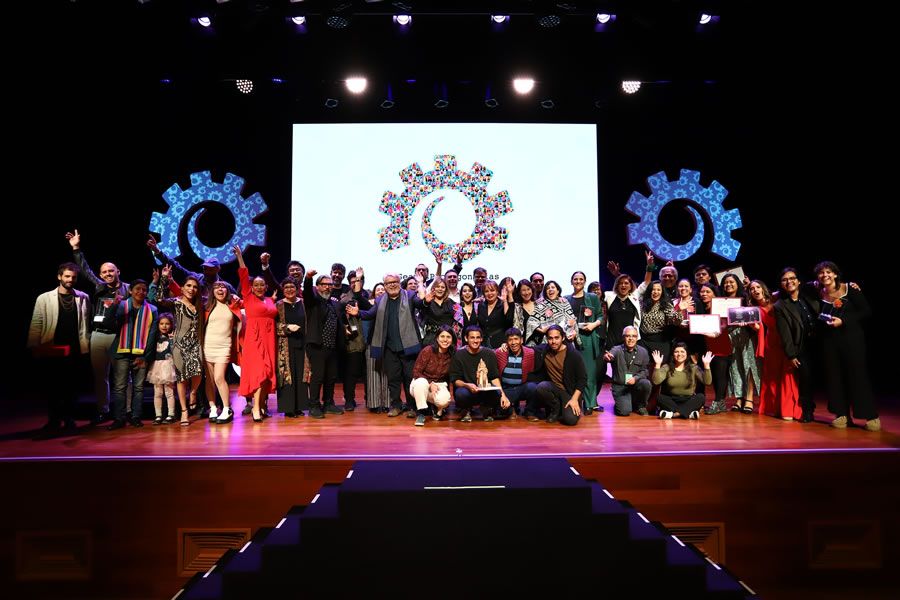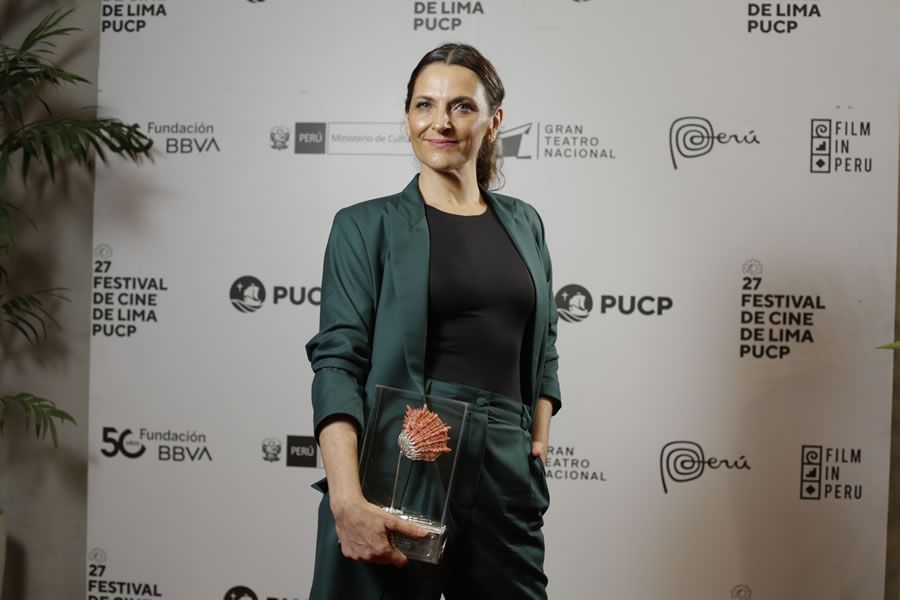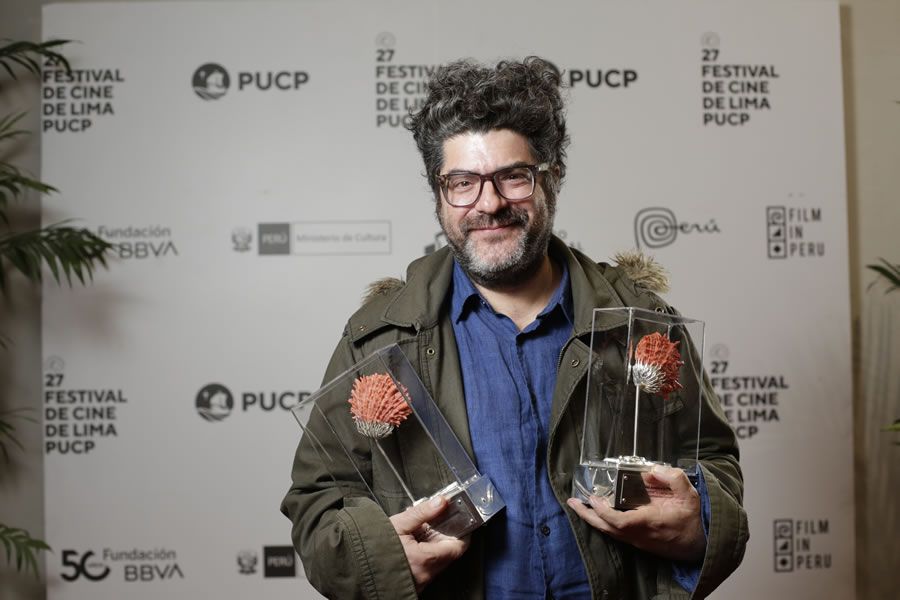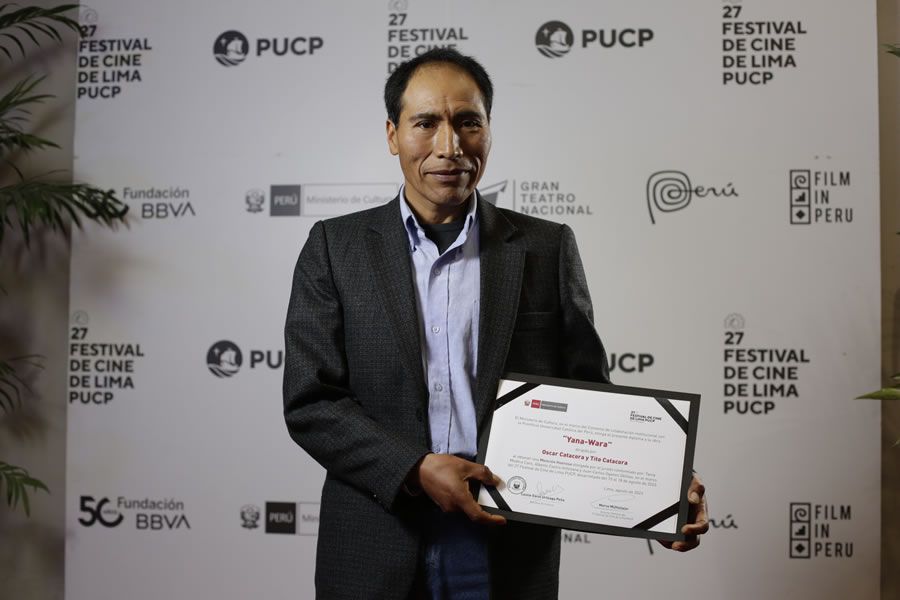08/22/2023
Lima Film Festival Awards: A Feast of High-Quality Latin American Cinema
By Daniel Ruiz (Twitter: @tatoruiz), accredited by CineVista at the Festival
A High-Quality Latin American Cinema (Including Lesser-known Works)
For nine days, the capital of Peru reveled in the celebration of cinema with a showcase (including competition) of films that will shape the cinematic landscape in the region for the rest of the year and part of the next. Of course, this showcase included Peruvian cinema.
In this edition of the festival, as commented by its artistic director, Josué Méndez, the participation of national cinema was the largest in its entire history. Twelve premieres + 1 were presented, as within the framework of the same festival, and as a "surprise screening," the team decided to showcase Josué Méndez's latest work, "El caso Monroy," a film starring Damián Alcázar and quite unsuccessful, filled with stereotypes and artistic choices that leave much to be desired. It appears, in any case, to be the work of a newcomer.
On Friday, August 18th, the festival concluded with a diverse and varied award list. In the fiction competition, which included 16 films, the top prize went to "Tótem," the latest film by Lila Avilés, a fairly balanced ensemble film in which the characters bear deep family wounds, leading to an emotional and well-executed climax after a slow-burning plot. On the other hand, the Peruvian film "Historia de Shipibos" by Omar Forero received an honorable mention, while Lisandro Alonso's film received a Special Jury Prize, an award that seems like a pat on the back for an influential director and that, with "Eureka," once again divides its audience.
In the same fiction category, Argentine filmmaker Rodrigo Moreno was awarded Best Director for the playful and whimsical "Los delincuentes," a new classic, an entirely enjoyable film that speaks about the pursuit of freedom without didactic or proselytizing intentions. It's an intoxicating proposal that begins with a bank robbery, with its protagonists always teetering on the edge of moral and ethical correctness.

The award for Best Screenplay went to Felipe Gálvez and Antonia Girardi for the outstanding "Los colonos," Gálvez's debut, which brings to mind the genocide of the Selknam people in Tierra del Fuego, Chile. The film, featuring notable actors like Alfredo Castro, Mariano Llinás, Luis Machín, and Marcelo Alonso, is a sophisticated exercise that carries a lot of wit. It's a sharp critique that continues to receive praise wherever it's presented. Here, at the festival, it also received the award from the Peruvian Association of Film Press' Jury.
In terms of performances, Antonia Zegers (Chile) and Marcelo Subiotto were awarded for their roles in "El castigo" and "La barbarie," respectively. I couldn't see the Argentine film, but my colleagues spoke highly of it. Matías Bize's film with Zegers is quite respectable, and the depicted anguish is heightened by its technique: a continuous shot. However, it must be said that it's precisely in the protagonists that one finds the film's great charm.

The Best Debut award went to Valentina Maurel from Costa Rica for "Tengo sueños eléctricos," an "unusual" coming-of-age film where the characters follow paths much more complex than what such films typically portray. It revolves around a father-daughter relationship depicted as a continuous clash, as they both grow in their own ways, experience a sort of (late or secondary for the father) adolescence, and are constantly united by violence and the deep love they share. It's a fascinating and energetic film, and its lead actress, Daniela Marín, is a talent worth keeping an eye on if she chooses to continue her acting career. Incidentally, the film is already available on Mubi's catalog.
Now, within this (fiction) category, there were significant omissions in terms of awards. The most recent work by Amat Escalante, "Perdidos en la noche," which is, it must be said, his weakest film. Even more overlooked (a questionable decision) was the posthumous work of Óscar Catacora (Wiñaypacha), completed by his uncle, Tito Catacora, "Yana-Wara," a film highly regarded by the local audience that ended up with a minor award. Likewise, the debut film by Peruvian director Leonardo Barbuy Latorre, "Diógenes," a film with exquisite cinematography and narrative economy. It's a reflection on freedom and grief that won two awards at the previous edition of the Malaga Film Festival, but left empty-handed here. Sometimes there are things that one doesn't quite understand.

Moving on to the documentary category, the top prize went to Kleber Mendonça Filho, one of the most beautiful documentaries in the selection. An ode to Recife, the director's hometown, "Pictures of Ghosts" encapsulates all the thematic obsessions of its director, stringing together a significant portion of his filmography. The film is tailor-made for cinephiles. It's a tribute to analog cinema, to formative temples that function as a kind of spiritual guide for cinephiles, and, of course, a criticism of real estate speculation and money laundering turned into pharmacies.
The Argentine film "El juicio," an extremely intense film due to its theme and duration, received a special mention. Ulises de la Orden's film condenses (but does not summarize) the entire trial material of the junta hearings in three hours, the judicial process held in 1985 for the members of the first three military juntas of the dictatorship in Argentina. It's a harrowing and utterly urgent document, structured by themes and divided into 18 chapters, making the reading and storytelling easier through meticulous study, which they also took care to restore in the best possible way. This film has a precedent (linked to broader interest), Santiago Mitre's fiction film, which in some way brought the subject into the limelight worldwide.
When it comes to awards, the great omission in the documentary category was Maite Alberdi's proposal, "La memoria infinita," a film that many thought would receive various awards and that left a great majority of the audience, myself included, stunned in theaters. It seems that the entries in this category didn't excite many of the jurors. The works of Tatiana Huezo ("El eco"), Pavel Giroud ("El caso padilla"), and Martín Benhimol ("El castillo") didn't make a particularly strong impression.

In this category, I feel compelled to talk about a Colombian work that deserves attention: "Transfariana" by Joris Lachaise, a documentary that has its narrative foundation in the romantic relationship between a transgender former sex worker and an ex-FARC guerrilla fighter in prison. Unfortunately, it's not a very well-executed film. Its flaw: it tries to encompass too much, including the contexts surrounding the pursuit of a leftist government, which got buried in 2018, making way for the dominance of Uribe and the unsavory Iván Duque. Nevertheless, it's one of those important films that narrates the historical moment that our country has gone through in relation to issues of equity, sexual diversity, politics, and social justice. The film received the GIO award for Best LGBTIQ+ Themed Film.
The festival audience also had its say, and the award stayed within the country. It was given to the documentary "Rojo profundo" by Maga Zevallos, a film that, in a country like this, stirs polarization. It portrays the life of one of the key figures in the national left, Javier Diez Canseco Cisneros, an unwavering fighter for social justice during Alberto Fujimori's dictatorship. The documentary has attracted the most staunch right-wing elements in the country, causing quite a stir upon its release. This situation only increases interest in seeing the documentary, which, not coincidentally, received the Audience Award. According to the premise of this festival edition, we, the audience, were among its greatest protagonists. Many of us eagerly await its commercial release. Expect some controversy.

Complete Awards List:
FICTION COMPETITION
The Fiction Jury of the 27th Lima Film Festival, consisting of María Carlota Bruno, Iván Fund, Melania Urbina, Fernanda Valadez, and Claudio Pereira, announced the following list of winners:
-
Jury Prize for Best Film: Awarded by Fundación BBVA (US$ 5,000)
Tótem | Dir. Lila Avilés | Mexico -
Honorable Mention from the Fiction Jury
Historias de Shipibos | Dir. Omar Forero | Peru -
Special Jury Prize
Eureka | Dir. Lisandro Alonso | Argentina -
Jury Prize for Best Direction
Los delincuentes | Dir. Rodrigo Moreno | Argentina -
Jury Prize for Best Actress: Awarded by Inter Artis Peru
Antonia Zegers | El castigo | Dir. Matías Bize | Chile -
Jury Prize for Best Actor: Awarded by Inter Artis Peru
Marcelo Subiotto | La barbarie | Dir. Andrew Sala | Argentina -
Jury Prize for Best Screenplay
Felipe Gálvez and Antonia Girardi | Los colonos | Dir. Felipe Gálvez | Chile -
Jury Prize for Best Debut
Tengo sueños eléctricos | Dir. Valentina Maurel | Costa Rica -
Jury Prize for Best Cinematography: Awarded by the Peruvian Society of Cinematographers (DFP)
Diego Tenorio | Tótem | Dir. Lila Avilés | Mexico -
Jury for Best Cinematography in the Fiction Competition
The Jury for Cinematography in the Fiction Competition of the 27th PUCP Lima Film Festival, composed of Micaela Cajahuaringa, Sergio Armstrong, and Mustapha Barat, announced the following winners: -
Honorable Mention for Best Cinematography
Andrés Felipe Morales | Memento Mori | Dir. Fernando López Cardona | Colombia
DOCUMENTARY COMPETITION
The Documentary Jury of the 27th PUCP Lima Film Festival, consisting of Tito Catacora, Agustina Pérez Rial, and Inti Cordera, announced the following list of winners:
-
Jury Prize for Best Documentary: Awarded by EGEDA (US$ 5,000)
Pictures of Ghosts | Dir. Kleber Mendonça Filho | Brazil -
Special Mention for Best Documentary
El juicio | Dir. Ulises de la Orden | Argentina
INTERNATIONAL CRITICS' JURY
The International Critics' Jury of the 27th PUCP Lima Film Festival, composed of Denise Tavares, Diego Brodersen, and Leny Fernández, announced the following list of winners:
-
International Critics' Jury Award for Best Film: Awarded by Fundación BBVA (US$ 2,500)
Los delincuentes | Dir. Rodrigo Moreno | Argentina -
First Honorable Mention
Eureka | Dir. Lisandro Alonso | Argentina -
Second Honorable Mention
Historias de Shipibos | Dir. Omar Forero | Peru
AUDIENCE AWARD
- Audience Award for the best-voted film in the Fiction, Documentary, and Made in Peru sections
Awarded by EGEDA (US$ 2,500)
Rojo profundo | Dir. Maga Zevallos | Peru
PUCP COMMUNITY AWARD
The PUCP Community Award Jury of the 27th PUCP Lima Film Festival, composed of Francisco Rumiche Zapata, Carmen Toledo Larios, Alessandro Zevallos Fajardo, Renata Fernández, Selene Muñoz Hernández, Maricielo Chilquillo Zuñiga, and Ayme Carbajal Arancibia, announced the following list of winners:
-
Award for Made in Peru Best Film
Islandia | Dir. Ina Mayushin | Peru -
Honorable Mention
Rojo profundo | Dir. Maga Zevallos | Peru
OTHER AWARDS
PERUVIAN MINISTRY OF CULTURE
The Peruvian Ministry of Culture Jury of the 27th PUCP Lima Film Festival, composed of Alberto Castro, Juan Carlos Oganes Oblitas, and Tania Medina Caro, announced the following list of winners:
-
Award for Best Peruvian Film: Awarded by EGEDA PERÚ (US$ 1,000.00)
Cielo abierto | Dir. Felipe Esparza | Peru -
First Honorable Mention
Yana-Wara | Dir. Oscar Catacora and Tito Catacora | Peru -
Second Honorable Mention
Rojo profundo | Dir. Maga Zevallos | Peru
International Labour Organization – CINETRAB
The Decent Work Awards Jury of the 27th PUCP Lima Film Festival, composed of Carmen Benitez, Luis González, and Manuel Siles, announced the following list of winners:
Decent Work Awards:
-
Award for Best Fiction in memory of Javier Neves Mujica for films that encourage, promote, and disseminate the notion of decent work. (US$ 2,500)
Cielo abierto | Dir. Felipe Esparza | Peru -
Award for Best Documentary in memory of Julio Gamero Requena for films that encourage, promote, and disseminate the notion of decent work. (US$ 2,500)
El eco | Dir. Tatiana Huezo | Mexico
PERUVIAN ASSOCIATION OF FILM PRESS - APRECI
The Peruvian Association of Film Press Jury of the 27th PUCP Lima Film Festival, composed of Alejandra Bernedo, Omar Cáceres, and Dixia Morales, announced the following list of winners:
-
Award for Best Film in Competition
Los colonos | Dir. Felipe Gálvez | Chile -
Honorable Mention
Los delincuentes | Dir. Rodrigo Moreno | Argentina
APC SIGNIS PERU - MONSEÑOR LUCIANO METZINGER COMMUNICATORS ASSOCIATION
The Monseñor Luciano Metzinger Communicators Association Jury of the 27th PUCP Lima Film Festival, composed of Marjorie Reffray, Javier Portocarrero, and José Antonio Ulloa, announced the following list of winners:
- APC Signis Peru Award - Monseñor Luciano Metzinger Communicators Association
The Buriti Flower | Dir. João Salaviza, Renée Nader | Brazil
CHRONICLES OF DIVERSITY
The Chronicles of Diversity Jury of the 27th PUCP Lima Film Festival, composed of Gia Lujuria, Ana Karina Barandarián, and Álvaro Costa, announced the following list of winners:
- Gio Award 2023 for Best LGBTIQ+ Themed Film
In memory of activist Gio Infante, who passed away in January 2020
Transfariana | Dir. Joris Lachaise | Colombia
CREATIVITY AND ARTS SCHOOL - ECRAN
The Creativity and Arts School Ecran Jury, composed of Gonzalo Otero, Gisella Ramírez, and Daniel Vega, announced the following list of winners:
- ECRAN Award for emerging filmmakers
For the best direction of a debut or second feature in the Fiction Competition
Valentina Maurel | Tengo sueños eléctricos | Dir. Valentina Maurel | Costa Rica
PERUVIAN WOMEN FILM DIRECTORS' ASSOCIATION NUNA
The NUNA Peruvian Women Film Directors' Association Jury, composed of Rocío Lladó, Marité Ugás, and Joanna Lombardi, announced the following list of winners:
- NUNA Award for Best Latin American Director in competition
Tengo sueños eléctricos | Dir. Valentina Maurel | Costa Rica
<< Go to Spanish version
